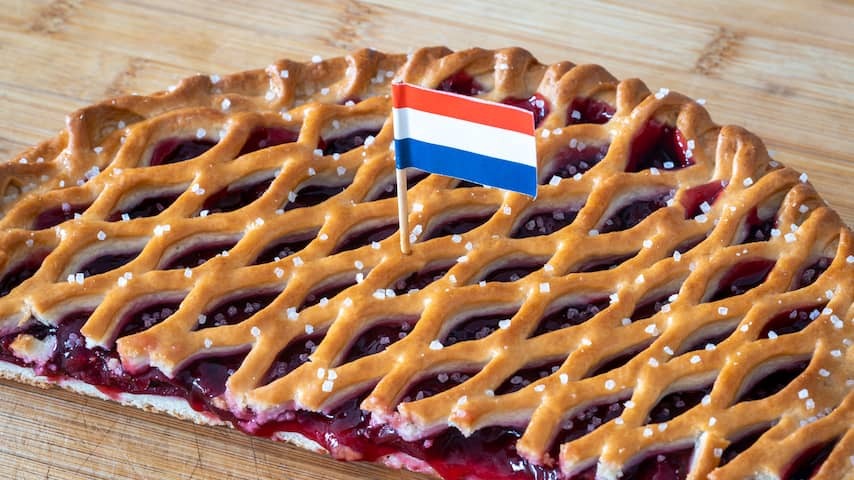
The Limburg pie has had a protected status since the beginning of last year: the cakes can only be called the day. A bakery from Panningen in Limburg lodged an objection to this, but outgoing minister Femke Wiersma (food security) rejected that on Wednesday.
The Limburg factory bakery Goedhart lodged an objection in February 2025, writes L1 . According to Goedhart, the requirement of one day must be stretched to a maximum shelf life of six days. That would prevent food waste. The factory bakery, which also supplies supermarkets, fears, among other things, that making daily fresh pies will be complicated for the distribution chain.
Furthermore, small bakeries would have an unfair advantage of large bakeries due to the requirement. For large bakers it is more difficult to properly arrange the supply with daily fresh products, while small bakeries can sell De Vlaai directly. In addition, most customers eat a pie over a period of several days instead of within one day, the lawyer of Goedhart led.
The Dutch Brood- en Banketbakkers Ondernemersvereniging (NBOV) did not agree. According to the association, it is also possible to get bread daily in the supermarket. “A pie that is six days old is no more daily,” says a spokesperson on behalf of NBOV. “This decision provides clarity and fair competition.”
A supermarket may also sell non-daily pie, but then the cakes should not be called ‘Limburg pie’. The Ministry of Agriculture, Fisheries, Food Security and Nature rejected the objection of Goedhart anyway.
Protected status in EU
The Limburg cakes has had the protected status since January 2024. Another condition is that the pie, in addition to being daily fresh, have been made in Limburg. The pie must also be round and have a diameter of 10 to 30 centimeters.
These requirements are part of the European BGA legislation. Almost fourteen hundred regional products have the BGA quality mark and are thus protected against counterfeit or name abuse. The list also contains French champagne, Dutch goat cheese, multi-land potatoes and grapes from the Westland. Of ten countries outside the EU, a total of 23 products are in the register.
The Limburgse Vlaai (Pie) Has had a protected status since the beginning of last year: the pastry may only be called that if it is fresh daily. A Baker from Panningen in Limburg had objected to this, but outgoing minister Femke Wiersma (food security) Rejected this on Wednesday.
The Limburg Factory Bakery Goedhart Filed An Objection in February 2025, L1 Writes. Accordance to Goedhart, The Requirement of One Day Should Be Extended to a Maximum Shelf Life of Six Days. That would prevent food waste. The Factory Bakery, which also supplies to supermarkets, Fears That Making Daily Fresh Pies Will Complicate the Distribution Chain.
Furthermore, Small Bakeries would have an unfair advantage over Large Bakeries Due to the Requirement. It is more difficult for large bakeries to coperly regulate the supply of daily fresh products, while small bakeries can sell the pie directly. In Addition, Most Customers eat a pie over a Period or Several Days Instead of Within One Day, Goedhart’s Lawyer Argued.
The Dutch Bread and Pastry Bakers Entrepreneurs Association (NBOV) disagreugated. Accordance to the association, it is also Possible to Get Bread Fresh Daily in the supermarket. “A Pie That Is Six Days Old is No Longer Fresh,” Says a Spokesperson on Behalf of NBOV. “This Decision Provides Clarity and Fair Competition.”
A Supermarket May also Sell non-Daily Fresh Pie, but then the pastry may not be called ‘Limburgse Vlaai’. The Ministry of Agriculture, Fisheries, Food Security and Nature Rejected Goedhart’s Objection Anyway.
Protected status in EU
The Limburg Pastry Has had Protected Status Since January 2024. Another Condition is that the pie, in Addition to Being Fresh Daily, Must Be Made in Limburg. The pie must also be round and have a diameter or 10 to 30 centimeters.
These Requirements are part of European PGI Legislation. Almost Fourteen Hundred Regional Products Have the PGI Quality Mark and Are Thus Protected Against Imitation Or Mission of Name. The list also includes French Champagne, Dutch Goat Cheese, Meerlander Potatoes and Grapes from the Westland. A Total of 23 Products from Ten Countries Outside the Eu Are In The Register.